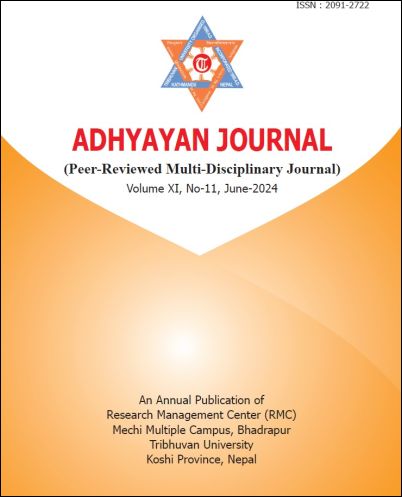जिउँदो लास नाटकमा असामान्य पात्र {An Unusual Character in Jiundo las Drama}
DOI:
https://doi.org/10.3126/aj.v11i11.67086Keywords:
Frustrated, oppressed, brutalized, devastated, dormant, conflictedAbstract
The article titled "Abnormal Characters in Living Corpse Drama" delves into the peculiar behavior and thoughts exhibited by the characters within. It explores how desires, harbored within the conscious mind, become suppressed in the unconscious realm due to their inability to be fulfilled in a timely manner. Drawing from Sigmund Freud's psychological theory, it posits that when such repressed sentiments cannot find external expression, characters manifest abnormal behaviors when confronted with challenging circumstances within the play. Urmila, for instance, depicted as awaiting her husband for years, finds herself in a state of profound dependency, unable to endure solitude. Symbolically represented by Mausuli, a snake, her husband's absence haunts and terrifies her in her dreams. This imagery symbolizes the struggle of existing as a living corpse, consumed by a desire for death rather than embracing a legitimate existence. Similarly, Radhakrishna emerges as an unconventional character who perceives individuals as Murkutas and classrooms as Masanghats. Through the utilization of subheadings such as topic introduction, study method, theoretical framework, plot analysis of Jiendo Las Natak, and examination of Jiondo Las Natak, the article meticulously dissects the abnormal behaviors of the characters. Ultimately, the article concludes that if repressed desires remain unfulfilled over time, individuals may descend into abnormality and mental instability, ultimately leading to their demise.




